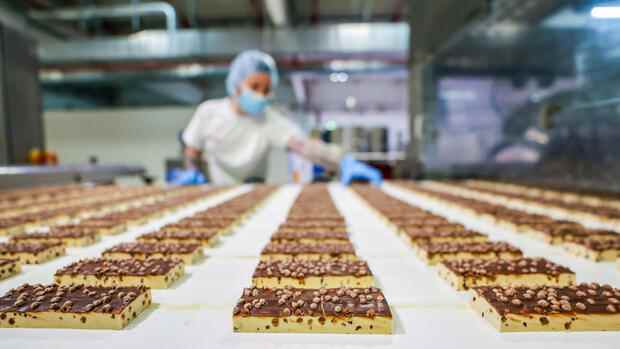High energy prices meant that groceries were an average of 22.3 percent more expensive in August than in the previous year.
(Photo: dpa)
Frankfurt The German manufacturers surprisingly raised their prices in August to an unprecedented extent due to the enormously high oil, gas and electricity costs. Producer prices rose by an average of 45.8 percent, as reported by the Federal Statistical Office on Tuesday.
This is “the highest increase compared to the same month last year since the survey began in 1949,” it said. This far exceeded the previous record value of 37.2 percent, which was reached in July.
That comes as a surprise: economists surveyed by the Reuters news agency had expected a decline to 37.1 percent. Producer prices increased by 7.9 percent from July to August. “This is also the highest increase compared to the previous month since the beginning of the survey,” it said.
Economists were surprised by the strength of producer-level inflation. “An unbelievable price hammer,” commented LBBW economist Jens-Oliver Niklasch on the development. “None of this bodes well for inflation. It’s here to stay.” Producer prices are considered to be the forerunners for the development of general inflation.
Top jobs of the day
Find the best jobs now and
be notified by email.
For Ralph Solveen, today’s producer prices carry a mixed message: “Although the decelerating momentum in intermediate goods prices gives us reason to believe that consumer price increases will also peak in the coming months. However, the renewed surge in energy prices shows that there is considerable potential for uncertainty and that consumer price inflation can also be expected to set new record highs in the coming months.”
In the statistics, the prices are listed from the factory gate – even before the products are further processed or sold. In August, consumer prices were 7.9 percent higher than a year earlier. The Bundesbank expects a further boost in September with the expiry of the 9-euro ticket and the tank discount: The inflation rate should “advance into the double-digit range in the next few months”, it had declared the day before in its monthly report and a recession forecast for the German economy.
Energy is the price driver
The main reason for the sharp rise in producer-level inflation is energy, which has cost significantly more since the start of Russia’s invasion of Ukraine on February 24th. Here, producer prices were 139.0 percent higher than in August 2021. Compared to July 2022 alone, these prices rose by 20.4 percent.
Natural gas cost more than three times as much as a year earlier (+209.4 percent), power plants even paid 269.1 percent more for natural gas, industrial customers 264.9 percent. Within one year, electricity prices rose by 174.9 percent, by as much as 278.3 percent for resellers and by 195.6 percent for customers with special contracts.
37.0 percent more was required for petroleum products. Light heating oil was more than twice as expensive as a year earlier (+104.0 percent), while motor fuels were 27.3 percent more expensive.
The high energy prices are also having an impact on intermediate goods (plus 17.5 percent) such as metals and basic chemicals. Durable and consumer goods are also affected by significant price increases (10.9 percent and 16.9 percent). For example, food was 22.3 percent more expensive on average in August than in the previous year. Producer prices affect consumer prices.
More: For many Germans, the dream of owning their own home is over
